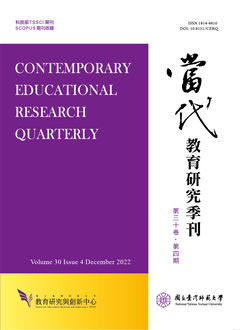

研究目的
臺灣原住民族語言和文化,長期被教育體制邊緣化,在教材中亦常被忽略。近年原住民族委員會與教育部為了部落族語教學,委託國立政治大學原住民族研究中心編輯《原住民族語高級教材- 文化篇》,內容包含大量原住民族的語言、文化與歷史論述。因此,本研究目的:參考Veracini(2007, 2010)定居殖民論觀點,檢視此教材內容是否揭露對過往原住民族被主流社會掌控之各種轉化/ 殖民方式之反思,及呈現去殖民實踐的狀況,並檢視去殖民理論與實踐間的辯證連結關係。最後,針對去殖民實踐可能面臨之困境,提出省思。
研究設計/方法/取徑
臺灣原住民族目前十六族,包括次語別,共42 種語別。本研究參考定居殖民論,對《文化篇》進行內容分析(Krippendorff, 2018),並對分析結果作詮釋。另為瞭解原住民族所關注之議題及其強度,作為內容分析結果之對照,乃進行文字雲(word clouds)分析。
研究發現或結論
一、《文化篇》內容,所揭露對過往原住民族被主流社會掌控的轉化/ 殖民方式之反思包括:同化轉化、沒收命名權轉化、族群轉化、表演轉化、生活方式被迫改變轉化等五種,這些轉化方式的察覺,奠定原住民族去殖民實踐的基石。
二、所呈現去殖民的實踐狀況,包括族語保存與復振、特色文化保留與發展、族群身份認定與族名恢復、土地歸還、參政權保障、媒體建立、部落自治意識覺醒、自治政府籌設、訂定各族歲時祭儀日等九項。
三、族語教材中「原住民族對過往被主流社會掌控的轉化/ 殖民方式之反思」與「去殖民的實踐」間,雖已呈現初步的辯證連結關係, 但還不夠周全,其間仍存有對立或矛盾,導致去殖民實踐上之困境。
因此,本研究提出「知識多樣性」觀點,即原住民族知識體系, 透過與不同族群知識體系平等交匯,具有觸發創新知識之功能,鼓舞原住民族有信心建立以自身為中心的知識體系,進而可作為克服這些困境的基礎。
研究原創性/價值
本研究發現定居殖民理論,在分析族語教材之去殖民論述,具有參考作用。另外,也顯示族語教材不僅是族語復振的教學載具,而且也替原住民族發聲,揭露對過往被主流社會掌控的轉化/ 殖民方式之反思,呈現去殖民的實踐,及分析理論與實踐間的辯證連結關係。因此,族語教材《文化篇》對原住民族的去殖民察覺與實踐,有所助益。
Purpose
In Taiwan, indigenous languages and cultures were marginalized in the education system for a long time while also being neglected in the curriculum and textbooks. Recently, to promote the teaching of indigenous languages, the Council of Indigenous Peoples and the Ministry of Education commissioned the Center for Aboriginal Studies at National Chengchi University to publish the Advanced Indigenous Languages Textbooks—Cultural Topics. This set of textbooks includes a large amount of discourses on indigenous language, culture, and history. Incorporating the settler colonialism theory by Veracini (2007, 2010), this study examines whether the contents of these textbooks reveal reflections on the various settler colonization tactics utilized by mainstream society to control indigenous peoples in the past, and also depict the praxis of decolonization. Moreover, it also examines the dialectical connection between decolonization theory and praxis. Finally, this study provides reflections on the ways to overcome the obstacles of achieving decolonization praxis.
Design/methodology/approach
There are currently 16 officially recognized indigenous cultures in Taiwan with their own language. Of these 16 languages, some even have sublanguages, which make up a total of 42 languages.
In this study, the settler colonialism theory was referenced to conduct a content analysis (Krippendorff, 2018) of the Advanced Indigenous Languages Textbooks—Cultural Topics and to interpret the textbook analysis results. To better understand the themes that indigenous peoples focus on and to investigate the frequencies of these themes in textbooks, a word cloud analysis was also conducted, and its results were compared with the results of the content analysis.
Findings/results
The contents of the Advanced Indigenous Languages Textbooks— Cultural Topics reveal reflections on the various settler colonization tactics used by mainstream society to control indigenous peoples in the past, which were mainly accomplished via 5 settler colonization transfer methods: transfer by assimilation, transfer by name confiscation, ethnic transfer, transfer by performance, and transfer by coerced lifestyle change. Awareness of these transfer methods sets the foundation for decolonization praxis for indigenous peoples.
Furthermore, these textbooks depict the praxis of decolonization, which includes nine relevant topics: the preservation and revitalization of indigenous languages, the restoration and development of indigenous cultures, the identification of indigenous groups and restoration of indigenous surnames, the return of indigenous territory, the affirmation of political participation rights, the establishment of indigenous media, the awakening of indigenous autonomy consciousness, the designing of indigenous autonomous governments, and the establishment of holidays for indigenous seasonal rites and festivals.
In these textbooks, there is a preliminary dialectical connection between the “reflections on the various settler colonization tactics used by the mainstream society to control indigenous peoples in the past” and the “praxis of decolonization.” However, the dialectics between the two are not comprehensive enough and there are still conflicts or contradictions between them. This results in obstacles to implementing the praxis of decolonization.
Regarding the obstacles of implementing decolonization, this study proposes a viewpoint of the diversity of indigenous knowledge. Through the interaction of these indigenous knowledge systems with those of other communities, the former functions to generate new and innovative knowledge. This viewpoint can inspire indigenous peoples to build up their own indigenous-centered knowledge systems with confidence and can also serve as a basis for overcoming obstacles to implementing decolonization praxis.
Originality/value
This study reveals that the settler colonialism framework by Veracini (2007, 2010) provides an appropriate theoretical basis for analyzing indigenous decolonization discourse in indigenous language textbooks. Moreover, these textbooks are not only a teaching tool for indigenous language revitalization, but also a voice for indigenous peoples, revealing reflections on the methods whereby mainstream society has colonized the indigenous peoples in the past and presenting the praxis of decolonization. Furthermore, the preliminary dialectical connection between the theory and praxis of decolonization is also analyzed in these textbooks. Finally, these textbooks are helpful in the awareness and practice of decolonization for indigenous peoples.

本著作係採用創用 CC 姓名標示-非商業性 3.0 台灣 授權條款授權.
本刊國立台灣師範大學教育研究與創新中心
106台北市和平東路一段162號 | 電話: 02-7749-3670 | E-mail: cerecerq@gmail.com
教創中心 | 師大 | 電子報 | 線上投審系統
本刊由國家科學及技術委員會人文社會科學研究中心補助經費
© 2014 CERI-NTNU
